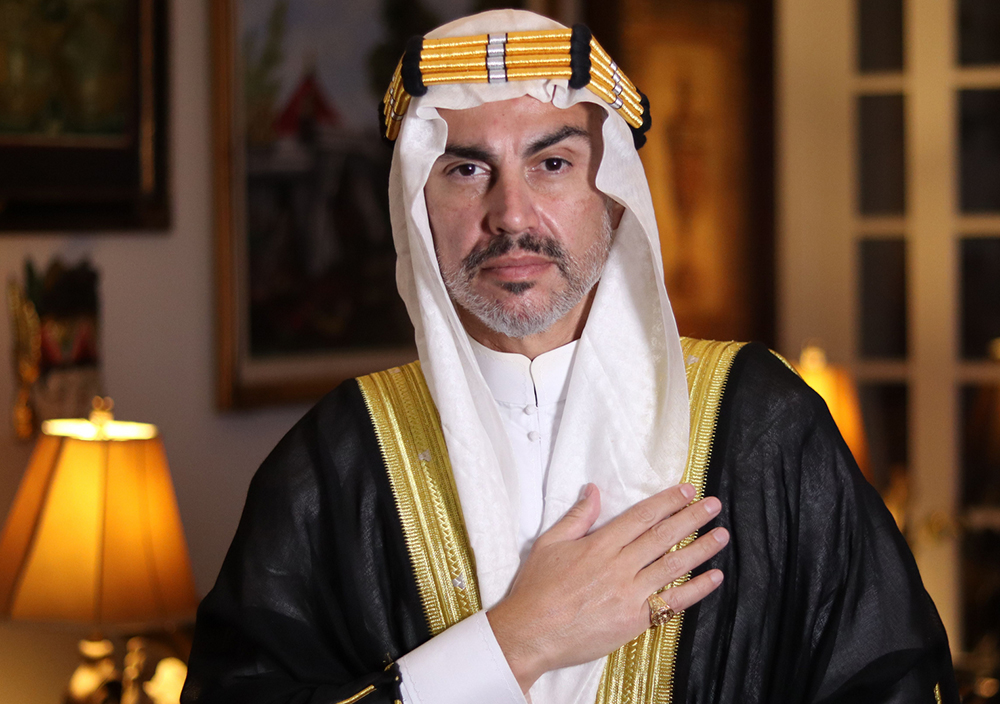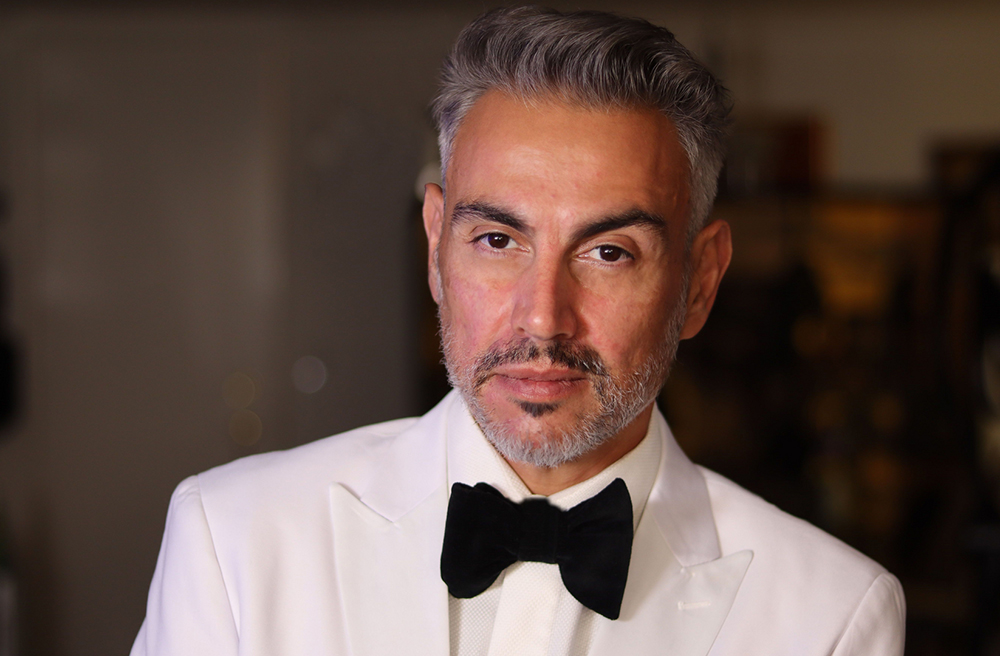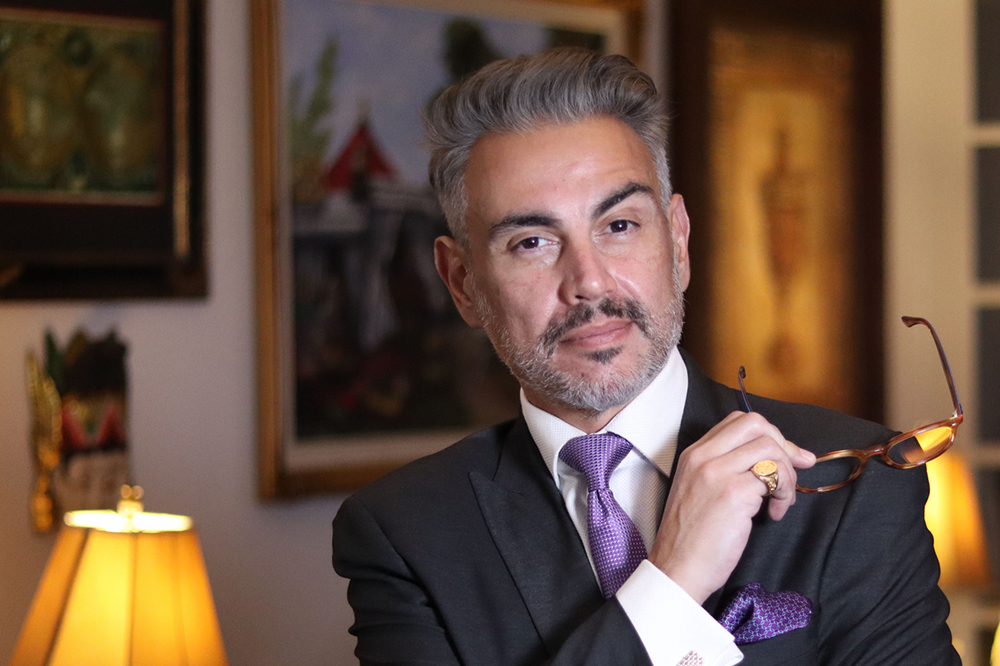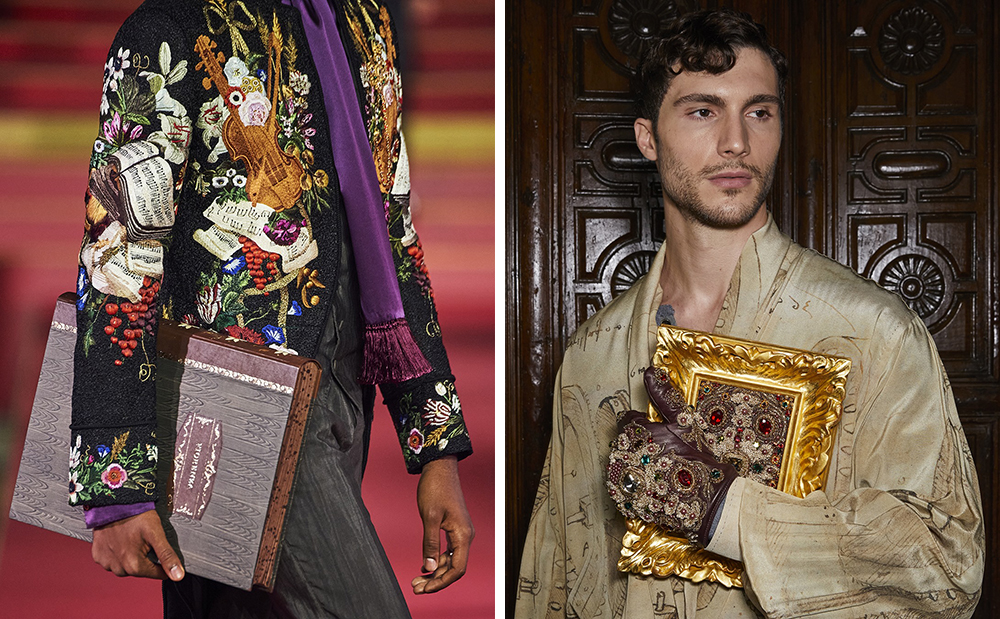Exclusive interview with His Royal Highness Prince Gharios El Chemor Al-Nu’man VIII, Head of the Sovereign Imperial and Royal House of Ghassan
The Ghassanids ruled over the largest territory for the longest period in the Middle East, more than any other Arab dynasties could. Nonetheless you were born in Brazil in a different era and far from your family’s former homeland. How do you describe your feelings and relationship about the current Lebanon and it’s people?
It’s a very interesting situation. Many people confuse me as “prince of Lebanon” which is not accurate. The closest to “princes of Lebanon” would be my cousins from the Chehab family who ruled Mount Lebanon on behalf of the Ottoman Empire. The first Ghassanid State was in modern-day Syria, Jordan, Lebanon, parts of Iraq and Saudi Arabia. Lebanon was a country “per se” only in 1946. My direct family left the region in 1914, when the area was still part of the Ottoman Empire. That’s why today in Brazil the Syrian and Lebanese descendants are vulgarly (and inaccurately) known as “Turks”, since they brought a Turk Ottoman passport with them. My family, since the Ottoman’s inception in the area, was always sovereign and independent like, for example, modern-day Monaco and Luxembourg. That being the reason why we were outcast and persecuted. Back to 1914, due to the persecution, my direct family had to change our surname a century earlier from “El Chemor” to “Gharios” (“Gregory” in Aramaic) which was the first name of the son of the last Christian Ghassanid ruler HRH Sheikh Youssef El Chemor. He swore to “hunt” all of the Ottoman corrupted officials. Well, it was a David and Goliath’s situation which has ended with my ancestor’s deposition and assassination. But even “the great Goliath” fell hard a couple hundred years later when the Ottomans lost the war and their empire. But the Lebanese paid a very painful price since the Ottomans starved to death half of the Lebanese population in addition to the Armenian Genocide. That situation was unbearable for many inhabitants of Mount Lebanon which created a colossal diaspora, especially to Brazil, where today we have almost three times more Lebanese than in Lebanon.
A few weeks ago there was a big explosion in Beirut. What do you think, after this catastrophe how the city and the country can recover? Once Lebanon was called the ‘Switzerland of the East” as a major financial and commercial center. What do you think about the future of the nation? Which would be the best direction for the country?
Regarding my feelings for Lebanon, in addition to my blood, I’ve visited the country several times officially invited by the government and I had the pleasure of living there for eight months. Even with all the problems, there’s no way of not falling in love with the country and the warm and beautiful people. Sadly, the problems with the country are evolving from decades. Hopefully, after this tragedy, it’ll be time for a new birth for Lebanon. I believe that a complete reform of the whole political and economical establishment is needed. God willing, with the protection and supervision of a well-intentioned foreign country like France.
If somebody reads your biography easily can think your are a modern polyhistor. You have tried yourself in the film and music industry, studied art and had a PhD. You have written several books, one of them is a real rarity about dynastic and nobility law. What comes next?
I believe that one of the most important qualities of humanity is our ability to learn. My most precious asset is my mind. Especially since, regarding my body, except for the martial arts, I was never a great sportsman. Right the opposite, I was always the chubby kid bullied in school. I’ve always been terrible in all sports. Even today.

As you mentioned you are an expert in Eastern martial arts. Even though you are the head of the world’s oldest Christian royal house, Buddhism is really important to you. How do you reconcile them?
I’ve been fascinated by the Asian culture since I was five years old. I’ve started with the Japanese martial arts. My father forced me to start Judo since he was a practitioner. I didn’t like the competition factor and I’ve left after a couple of years. But I got “the bug”. After that I’ve studied many different martial arts like several styles of karate, Kung fu, Kobudo, kali Silat, Brazilian jiu-jitsu, European fencing, etc. In my early teenage years I started Aikido, which has opened the doors for all aspects of the Japanese culture. I’ve studied religion, language, calligraphy, music, etc. I ended up becoming one of the most influential Aikido masters in Brazil holding high teaching credentials and forming many of the actual masters active today there. I’ve also got a karate and Kobudo black belts. With Aikido I’ve discovered the Shinto religion and Zen Buddhism. With that, a couple of years later, I discovered Tibetan Buddhism becoming a student and even a lecturer about it. Buddhism is not a religion “per se” since it doesn’t have dogmas. It doesn’t even have the clear concept of divinity. Buddhism is ultimately how you can train your mind to diminish suffering for yourself and others. Also, how to cultivate compassion. Learning Buddhism has helped me to be a better Christian. Somehow, the philosophical concept of compassion in Christianity is more related to pity and mercy. You should forgive your aggressor, but that implies your superiority. Buddhism teaches you how to understand what has motivated your aggressor to do what he or she has done. Compassion is understanding the other’s sufferings and motivations. It’s easier to forgive when you feel the other person’s pain instead of just accepting the aggression and moving on. Cherenzing, the manifestation of compassion in Tibetan Buddhism has one of many manifestations as a woman with a thousand arms, meaning it should be available to everyone. In each palm of the hand there’s an eye, meaning it’s not just present but aware of the other person’s suffering, being in the person’s shoes, not just having pity. That made it easier to understand and respect other people’s perspectives.
Your are extremly active on the online platforms too. You run a YouTube and Instagram channel, you have started an online course about monarchy and geopolitics. On the other hand you are also a member in Equestrian Order of Michael Archangel which is one of the oldest knighthood in the world. What’s your opinion about the symbiosis of the modernism and the tradition?
I honestly don’t like social media. I think in the middle of the rare good resources there’s a sea of garbage and misinformation. But social media is a necessary evil today in order to promote one’s work. Regarding the Equestrian Order of Michael Archangel, it doesn’t claim “a legatee Succession” with any historical order of chivalry but with the legacy of some of the oldest Christian knights in history, the Ghassanids. Mainstream historians consider the genesis of Christian chivalry, the first crusade and the defense of the holy land. However, it’s documented that my people used to defend the holy land around four centuries before the first crusade adopting the known ideals of Christian chivalry before any European knights.
If the previous examples wouldn’t be enough you run several organisations and companies as well. Which are the most important in your life?
Well, the Royal House of Ghassan headquartered in the US is the parent organization to our main branch in Lebanon, to the Prince Gharios Foundation in Düsseldorf, Germany, to the Royal Academy in Bonn, Germany and to the One Voice Foundation. The royal house is not only my passion but also my duty. As a profession, I’m a corporate consultant with expertise in marketing and PR and an artist. I had classical theater training in Brazil and I started as a theater director in 1993. From that time on I’ve directed, wrote and produced a lot of projects. I’m a SAG actor since 2010 and recently I’ve released the documentary “the Christian Kings of the Middle East” available on YouTube. I’ve hosted, directed and produced it. I love the arts so much, I also paint and sing. I think I’ve got that from my mother’s side since my great grandfather was a maestro in Brazil.
You have got a lot of awards, for example you are the Goodwill Ambassador of Arkansas, you were elected the Noble Man of the Year in 2014 and awarded by President Trump as well. What do you think how people are thinking about the royals nowadays and particulary in Lebanon?
Regarding the awards, I’m very humbled from the accolades I’ve received in four continents, but my greatest award is to be able to help and inspire, to be relevant. As I always say, a title as a personal honor is absolutely useless in the twenty-first century. It has its historical significance but it dies in itself. The only reason my family and I keep this tradition is because we’re doing our best to be relevant today. Unfortunately, regarding Lebanon, the country is in a terrible situation. And it has been for the last decades. Lebanon is a small country in a very strategic position that has to keep eighteen religious groups in perfect harmony. A country with over a million refugees having four million inhabitants! I sincerely hope that the last tragedy may help to ultimately fix the situation there. There’s no active monarchical movement there but they are used to titles. Many families, like mine, kept them alive.

I saw pictures of you with the crown princes of Albania and Italy. Do you have a close relationships with other royals as well?
I’ve good relationships with ruling and non-ruling royal houses. However, even though we are the oldest Royal house of Christendom and also the oldest Arab dynasty still active, we’re relatively new in the foreign relations. Even in Lebanon, although the family’s titles never stop being recognized, we were only recognized as an Imperial and Royal House in 2019, by presidential decree. We’re translating documents and books to English since all the information was in Arabic and classic Arabic until recently. The royal house stayed dormant as a public organization for over three decades, even some family members actively using the titles, no official activities took place. After the passing of the last sovereign prince in 1971, his son and my cousin HRH Prince Sheikh Selim El Chemor was officially invited by Her Majesty the Queen for the 1996’s Royal Ascot and that was it. No further official events or anything. We’re reigniting those contacts now.
As the legitimate heir of a former country what are your most important duties as the head of the royal family?
Well, our original territory comprehends today’s Syria, Jordan, Lebanon, part of Iraq and northern Saudi Arabia. We don’t actively militate any territory because we believe it would just create more confusion to an already troubled region. Also, regarding Jordan, we believe that the Hashemites are doing a great work. I’m very fond of His Majesty King Abdullah II and his late father King Hussein. Even Saudi Arabia with its many problems is better than the neighboring republics. I’m really confident in the internal reforms that HRH Prince Mohammad Bin Salman is trying to make modernizing the country. However, we’ve a duty to the people living in the whole region. So we try to assist them the best way possible, raising awareness, preserving the culture, bringing relief and education. Royalty is about serving.
At last I would like to ask you to tell me how a normal day looks like for you. And how do you as a royal descendent spend an average weekend?
As I always say that even being a prince I still have to pay for Netflix like everybody else. My days are regular. Even with the pandemic I work a lot from home. The only “princely” activities I’ve are the official events we have and the ones we’re invited to. During my weekends, I really like to hike, play golf, shoot, practice martial arts, paint and write. I also love to watch films and listen to music. Everyday I do meditation and contemplation trying to fix my numerous flaws and to grasp what I can do to better serve my people and make the world a better place.
Photos: www.princegharios.org






